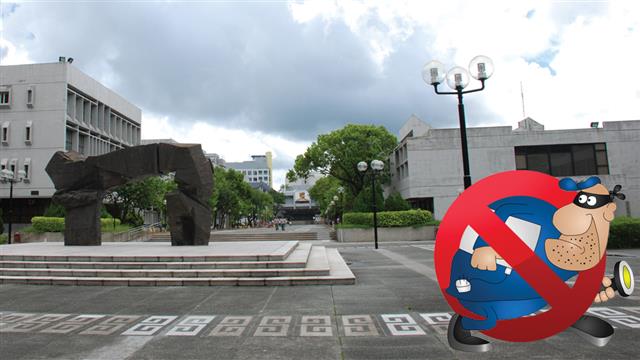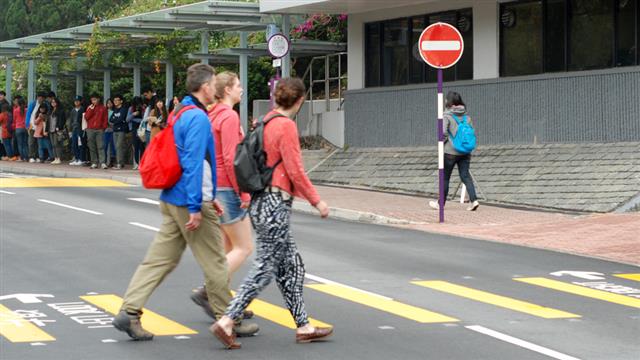The University campus is a safe and peaceful place, especially when compared to the rest of the city. Mr. Philip Wong, Director of Security and Transport, said that while the crime situation has been fluctuating from year to year, it has remained largely stable. He highlighted two prominent cases that have been solved in recent years, and alerted the campus community to certain prevalent risks and scams.
Arrest of the 'Rodent'
In 2012, a culprit code-named 'Rodent' by the office was captured. The man, in his 30s, would enter the CUHK campus (as he did other university campuses) in the wee hours of the morning, equipped with stolen smart cards available only to students. His crimes on our campus included stealing female underwear, taking drugs in handicap toilets, hiding pinhole cameras in ladies' toilets and watching the footage on his computer. He managed to dodge arrest for several months. Then one afternoon a former security staff was having tea at the poolside canteen when he spotted a fellow diner, a chubby man bearing a strong physical resemblance to a suspect captured on CCTV. Even the clothes looked the same. He alerted staff of the office. Together they approached and overpowered him. 'Rodent' was arrested, charged and sentenced to 40 months' imprisonment.
Tree Thieves
In July 2013, a vigilant staff member from the Estates Management Office noticed an elderly Chinese woman and a man (who later turned out to be her son), sawing an endangered incense tree (Aquilaria sinensis) on a slope near the Ho Sin-Hang Engineering Building. He hollered and when the pair took to their heels, alerted the Security and Transport Office who later found them near the Herbal Garden. They were subsequently arrested by police summoned to the scene. Follow-up investigation revealed they had committed similar offences outside CUHK. The pair was sentenced to three-and-a-half years' imprisonment for multiple accounts of theft.
The price of incense trees and their resin has been soaring in recent years, resulting in many cases of illegal felling and theft of the trees in Hong Kong. Over a hundred have been chopped in Pak Ngan Heung, Lantau, in the past few years. The thieves would first make cuts on the trunk to stimulate resin secretion, before returning to collect it and to fell the trees for profit.
Mr. Wong said the University is in the later stages of developing a sensor to be installed on valuable trees such as the incense tree. When someone is trying to saw or chop the tree, the device would send a signal directly to the office. The research project is led by Prof. Cheng Chun-hung of the Department of Systems Engineering and Engineering Management and Prof. Chiu Siu-wai of the School of Life Sciences.
Petty Theft and Road Security
Petty theft is prevalent on campus, Mr. Wong said, and students should take care not to leave their belongings, notably their valuables, lying around in school buses, lecture theatres, libraries, the gym and bathrooms. He reminded the CUHK community to maintain the same vigilance on campus as they would outside the University. 'People, especially students, tend to lower their vigilance on campus. While it's good they feel safe, they should be more careful.'
Many motorists and pedestrians on campus also fall victim to a false sense of security, Mr. Wong observed. 'Don't forget, the same traffic regulations that apply to Hong Kong also apply to CUHK. We are governed by the Road Traffic Ordinance.' When the sign says 'dismount', cyclists should do so for their own safety rather than forging ahead for a good workout. Drivers should stop before pedestrian crossings if there are people waiting on the curbside. And walkers should keep to the pavement even when vehicular traffic is not visible.
Phone Scam
Many University members may have received calls from strangers who claim to know them. The caller would start by enquiring if you recognize them in a familiar tone as if they know you. If you fall into the trap and assume they're an old acquaintance, they would then spin a sob story to win your sympathy before urging you to transfer money to a mainland bank account. Mr. Wong reported that both students and staff have been targeted by such callers. A mainland student, for instance, transferred money to a scammer whom he had mistaken for his high school teacher.
Round-the-clock Service
Staff and students of the University who encounter security issues can call the Security and Transport Office's 24-hour reporting centre at 3943 7999.





